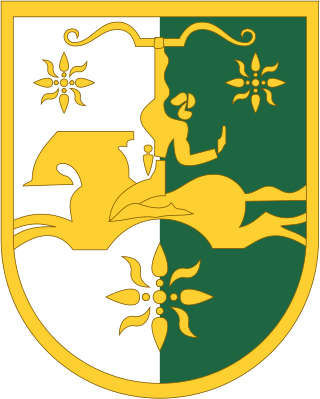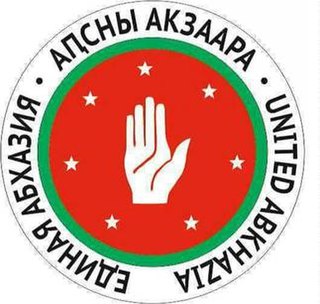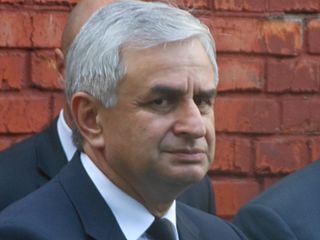On 7 May 1997, Shamba became Minister for Foreign Affairs, succeeding Konstantin Ozgan. [3] Throughout his time as foreign minister, it often fell to Shamba to defend Abkhazia's separation from Georgia in the international media. He has been a strong supporter of Abkhazian independence, and has flatly opposed any attempts at reunification with Georgia. Though he has headed several Abkhaz delegations to United Nations-sponsored talks with Georgia, Abkhazia has failed to receive any international recognition.
As foreign minister, Shamba dealt with several leaders of non-government organizations, meeting, among others, International Red Crescent Organization president Jean Michel Corbot. He succeeded in gaining USAID assistance for several reconstruction projects in Sukhumi.
In 1998, Shamba received his Doctorate from the Yerevan Institute of Archeology. On 9 July 2001, Shamba was awarded the diplomatic rank of Extraordinary and Plenipotentiary Ambassador. [2]
Shamba resigned from the post of foreign minister on June 14, 2004, citing a number of reasons, such as the murder, five days before, of fellow opposition leader Garri Aiba and the upcoming presidential elections. After his resignation, he openly called for the entire government to stand aside.
October 2004 presidential election
Shamba was one of the favorites to receive the nomination of the newly forged Amtsakhara-United Abkhazia opposition alliance for the October 2004 presidential elections. However, on July 20, 2004, the movements named former prime minister Sergei Bagapsh and Stanislav Lakoba as their respective presidential and vice presidential candidates. Shamba still participated in the election with Vladimir Arshba as his running mate and he came in third place with 6.9% of the vote. After the election a conflict broke between front runners Sergei Bagapsh and Raul Khajimba, which was only resolved when the two teams agreed to hold new elections in which they would participate on a joint ticket.
During the crisis on 15 October Shamba had founded the Social-Democratic Party of Abkhazia along with other people from his election campaign, chief of staff Gennadi Alamia became its first chairman. [4] The Social-Democratic Party called on voters to boycott the new elections and Shamba did not participate in it. [5]
Minister for Foreign Affairs (second time) and Prime Minister
On 15 December 2004 Shamba had again been appointed Minister for Foreign affairs by Ardzinba, replacing Igor Akhba. [6] The power-sharing agreement between Bagapsh and Khajimba stipulated that the latter could appoint the new Minister for Foreign Affairs, and Khajimba chose to keep Sergei Shamba, despite the fact that Bagapsh long insisted on appointing Natella Akaba. Even though Shamba had now joined the government, the social-democratic party stayed in opposition.
On 20 May 2009 the Social-Democratic Party was one of a number of opposition parties that during a press conference strongly criticised the government's foreign policy. [7] The criticism was rejected by Shamba two days later, dismissing it as "biased". [8]
Despite being considered by some to again be a possible candidate, [9] Shamba did not participate in the December 2009 presidential election. The election resulted in a second term for Sergei Bagapsh, and on 13 February 2010, Shamba was appointed prime minister, [10] succeeding Alexander Ankvab, who had become vice president. [2] [11] On 26 February Shamba was succeeded as Foreign Minister by his deputy Maxim Gvinjia. [12] [13]
August 2011 presidential election and retirement from active politics
The next presidential election was originally scheduled to take place in 2014, however, the Constitution of Abkhazia required an election to be held within three months after the unexpected death of incumbent president Sergei Bagapsh on 29 May 2011. Only three candidates participated: Shamba, outgoing Vice President and Acting President Alexander Ankvab and opposition leader Raul Khajimba. Shamba's vice presidential candidate was deputy chairman of the State Committee for Youth Affairs and Sport Shamil Adzynba. The pair was nominated by an initiative group on 8 July and applied for registration on 16 July. [14] [15] All presidential candidates passed their Abkhaz language test on 20 July 2011, were formally registered by the Central Election Commission on 25 July and received their certificates on 26 July. [16] [17]
Shamba and Adzynba received political support from the Party for Economic Development on 21 July, 10 (out of 12) members of the Association of Youth Organisations on 28 July and the Communist Party 9 August. [18] [19] [20] The election campaign was led by Beslan Eshba. [21]
The election was won by Alexander Ankvab. Shamba came in second place with 21.02% of the vote, narrowly ahead of Khajimba. [22]
After the election, Shamba retired from active politics. Observers noted that Shamba would have been above the legal maximum age for the Presidency at the time of the next election. Shamba himself has stated that he wanted to make way for younger politicians, hoping that Abkhazia had entered a new phase of sustained development and conflict-free transfers of power. [23]
Member of Parliament (second time) and Chairman of United Abkhazia
Shamba was one of the leaders of the protests that led to the May 2014 ouster of President Ankvab. After the election of Raul Khajimba as president, he participated in the 21 December by-election in Constituency no. 24 that had become necessary after Khajimba had appointed Adgur Kharazia as acting mayor of Sukhumi. [24] [25] On 3 November, Shamba's nomination by an initiative group was registered. [26] Shamba failed to obtain a first-round victory, but defeated Tengiz Agrba in the run-off on 28 December. [27] [28]
On 5 September 2015, Shamba became the leader of a faction he established along with six other members of the People's Assembly. [29] [30]
On 27 January 2016, Shamba was elected Chairman of United Abkhazia during its sixth congress, after Daur Tarba had resigned the role on 1 October 2015. [31] [32]
See also
Related Research Articles

Raul Jumkovich Khajimba is an Abkhazian politician, and served as President of Abkhazia from 25 September 2014 until 12 January 2020. He was also Chairman of the Forum for the National Unity of Abkhazia from 2010 to 2015. Khajimba previously held the offices of Vice President (2005–2009), Prime Minister (2003–2004) and Defence Minister (2002–2003). He unsuccessfully ran for president in 2004, 2009 and 2011. He resigned the presidency in 2020 due to protests against him.

The prime minister of Abkhazia is the de facto head of government of the partially recognized Republic of Abkhazia, that is de jure part of Georgia.

The office of Minister for Foreign Affairs of the Republic of Abkhazia was created on 17 May 1993, during the 1992–1993 war with Georgia. Empirical data nevertheless show that Abkhazia's Foreign Ministry also enacts diplomatic relations, such as the sending of diplomatic notes, with various countries across the world, including Nauru, Vanuatu, Venezuela, Nicaragua, and Syria. It is also active in managing relations with other post-Soviet de facto states such as South Ossetia, Transnistria, and the Lugansk People's Republic.

Sergei Uasyl-ipa Bagapsh was an Abkhaz politician who served as the second President of Abkhazia from 12 February 2005 until his death on 29 May 2011. He previously served as Prime Minister of Abkhazia from 1997 to 1999. He was re-elected in the 2009 presidential election. Bagapsh's term as prime minister included the 1998 war with Georgia, while he oversaw both the recognition of Abkhazia by Russia and the Russo-Georgian War during his presidency.

Aleksandr Zolotinskovich Ankvab is an Abkhaz politician and businessman who was the president of Abkhazia from 29 May 2011 until his resignation on 1 June 2014. He previously served as prime minister from 2005 to 2010 and as vice-president from 2010 to 2011 during the presidency of Sergei Bagapsh. He was appointed prime minister again on 23 April 2020.

United Abkhazia is a political party in Abkhazia. United Abkhazia was founded on March 25, 2004, as a socio-political movement, with the specific goal of presenting a single opposition candidate for the October 2004 presidential elections.

The Government of the Republic of Abkhazia governs the partially recognised Republic of Abkhazia.

Presidential elections were held in Abkhazia on 3 October 2004, the first that were competitive. Election law prohibited incumbent President Vladislav Ardzinba from running for a third term and he instead backed Prime Minister Raul Khadjimba, who also enjoyed support from the Russian authorities. Khadjimba's main opponent was Sergei Bagapsh, who was supported by the two major opposition parties, United Abkhazia and Amtsakhara, and later also by Aitaira when their candidate Alexander Ankvab was barred from running in a controversial decision by the Central Election Commission.

Daur Tarba is the current Minister for Agriculture of Abkhazia. In the past, he has also been Chairman of United Abkhazia at a time when it was the ruling party, Vice Premier and head of the Ochamchira District.

Presidential elections were held in Abkhazia on 12 December 2009, the fourth such elections since the post of President of the Autonomous Republic of Abkhazia was created in 1994. The result was a victory for incumbent president Sergei Bagapsh, who received 63% of the vote, winning a second term in office. Bagapsh competed against four opposition candidates: former vice president and prime minister Raul Khajimba, who came second behind Bagapsh in the 2004 presidential election, and newcomers Beslan Butba, Zaur Ardzinba and Vitali Bganba. Khajimba had stated that he, Ardzinba and Butba would support each other should one of them reach the second round of the election. Bagapsh was inaugurated on 12 February 2010.
The Social-Democratic Party of Abkhazia is an oppositional political party in Abkhazia. It was founded during the crisis that followed the October 2004 presidential election by people from the presidential campaign of Sergei Shamba, who had come third in the election. Besides Shamba himself, initial members included his vice presidential candidate Vladimir Arshba, chief of staff Gennady Alamia and former vice premier Albert Topolian. The foundational congress of the Social-Democratic Party took place on 15 October 2005 in the State Drama Theatre of Abkhazia, where Gennadi Alamia was elected its first chairman. The Union of Social-Democratic Youth was founded as the party's youth wing, headed by Abkhazian State University student Astamur Logua.
Stanislav Lakoba is an academic and politician from Abkhazia. Lakoba was Sergei Bagapsh's vice-presidential candidate in the 2004 presidential election and from 2005 to 2009 and again from 2011 to 2013 he served as Secretary of the Security Council. He is Professor in Archeology, Ethnology and History at the Abkhazian State University.
The Government of President Sergei Bagapsh was the Government of the Republic of Abkhazia from 2005 until 2011.

Presidential elections were held in Abkhazia on 26 August 2011. This was the fifth such election since the post of President of the Republic of Abkhazia was created in 1994. The election was held to elect the successor of president Sergei Bagapsh who died in office on 29 May 2011.
Leonid Yurivich Dzapshba is a two-time Minister for Internal Affairs of Abkhazia, a former Presidential candidate and the former head of the Football Federation of Abkhazia.

The Government of President Raul Khajimba was the Government of the Republic of Abkhazia from 2014 until 2020.
Rauf Aslanovich Tsimtsba was the third Minister for Taxes and Fees of Abkhazia, serving between 2011 and 2016 in the Governments of President Bagapsh, President Ankvab and President Khajimba. Tsimtsba was originally appointed on 4 April 2011 by Sergei Bagapsh to succeed Vakhtang Pipia, who had been appointed Vice Premier on 30 March. Before that, Tsimtsba had headed the Department for the Taxation of Legal Entities within the ministry. Following the Death of Bagapsh one month later and the election of Alexander Ankvab, Tsimtsba was re-appointed on 11 October.
Shamil Adzynba is the current First Vice Premier of Abkhazia in the Government of President Khajimba, and a two-time acting Prime Minister.
The State Security Service of Abkhazia is the principal security and intelligence agency of Abkhazia.
Dmitri Shamba is the Plenipotentiary Representative of the President of Abkhazia to the People's Assembly of Abkhazia and the First Deputy Head of the Presidential Administration.
References
- ↑ "Ex–Abkhazian PM calls for dialogue with Tbilisi". OC Media . 2018-08-16. Retrieved 2020-12-02.
- 1 2 3 4 Выпуск №69-70 (in Russian). Apsnypress. 13 February 2010. Archived from the original on 6 March 2016. Retrieved 13 February 2010.
- ↑ "Предыдущие Министры и их Заместители". 2008. Retrieved 20 February 2009.
- ↑ Kuchuberia, Angela (2004-10-16). В Сухуме состоялся учредительный форум социал-демократической партии Абхазии (in Russian). Caucasian Knot. Retrieved 2009-05-31.
- ↑ Kuchuberia, Angela (2005-01-12). В Абхазии начались повторные президентские выборы (in Russian). Caucasian Knot. Retrieved 2009-05-31.
- ↑ "В Абхазии назначены два вице-премьера правительства". Кавказский узел. 14 December 2004. Retrieved 13 December 2008.
- ↑ Fuller, Liz (2009-05-24). "Abkhaz Leadership, Opposition Exchange Accusations". Caucasus Report. Radio Free Europe/Radio Liberty . Retrieved 2009-05-29.
- ↑ Министр иностранных дел Сергей Шамба назвал обвинения, прозвучавшие в заявлениях "некоторых политических сил", "мягко говоря, необъективными" (in Russian). Администрация Президента Республики Абхазия. 2009-05-22. Archived from the original on 2012-02-16. Retrieved 2009-05-29.
- ↑ Fuller, Liz (2009-04-14). "Abkhaz Leadership Assesses Time Frame For International Recognition". Caucasus Report. Radio Free Europe/Radio Liberty . Retrieved 2009-05-29.
- ↑ "Abkhazia's President Sergey Bagapsh signed decree appointing Sergey Shamba Prime Minister of the Republic of Abkhazia". Official Site Sergey Bagapsh President of the Republic of Abkhazia. 13 February 2010. Archived from the original on 24 July 2011. Retrieved 2 March 2011.
- ↑ "Ex-Prime Minister Alexander Ankvab expressed gratitude to government, the Cabinet's office for honest work". Official Site Sergey Bagapsh President of the Republic of Abkhazia. 13 February 2010. Archived from the original on 24 July 2011. Retrieved 2 March 2011.
- ↑ "President Sergey Bagapsh issued decrees appointing Ministers". Official Site Sergey Bagapsh President of the Republic of Abkhazia. 26 February 2010. Archived from the original on 24 July 2011. Retrieved 2 March 2011.
- ↑ "New Abkhaz FM Appointed". Civil Georgia. 26 February 2010. Retrieved 27 February 2010.
- ↑ "ЦИК зарегистрировал инициативную группу по выдвижению Сергея Шамба кандидатом в президенты Абхазии". Apsnypress . 8 July 2011. Archived from the original on 5 April 2012. Retrieved 11 July 2011.
- ↑ "Сергей Шамба и Шамиль Адзынба подали заявление в Центральную избирательную комиссию о согласии баллотироваться на пост президента и вице-президента Республики Абхазия". Apsnypress . 16 July 2011. Archived from the original on 19 July 2011. Retrieved 31 July 2011.
- ↑ "Александр Анкваб, Рауль Хаджимба и Сергей Шамба сдали экзамен на знание Государственного абхазского языка". Apsnypress . 20 July 2011. Archived from the original on 5 April 2012. Retrieved 31 July 2011.
- ↑ "Центральная избирательная комиссия зарегистрировала кандидатами в президенты Александра Анкваба, Рауля Хаджимба и Сергея Шамба". Apsnypress . 25 July 2011. Archived from the original on 5 April 2012. Retrieved 31 July 2011.
- ↑ "Партия Экономического развития Абхазии поддержала кандидатуру Сергея Шамба на пост президента республики". Apsnypress . 21 July 2011. Archived from the original on 25 September 2011. Retrieved 31 July 2011.
- ↑ "10 из 12 организаций, входящих в Ассоциацию молодежных организаций Абхазии, заявили о поддержке кандидата в президенты Сергея Шамба". Apsnypress . 28 July 2011. Archived from the original on 5 April 2012. Retrieved 5 August 2011.
- ↑ "Политсовет компартии Абхазии поддержал кандидатуру Сергея Шамба". Apsnypress . 9 August 2011. Archived from the original on 5 April 2012. Retrieved 9 August 2011.
- ↑ Sharia, Vitali (18 August 2015). ""Родина" и "Народный фронт" по-абхазски". Echo of the Caucasus . Retrieved 19 October 2015.
- ↑ "Final results of the presidential elections in Abkhazia". Abkhazian Ministry of Foreign Affairs. 27 August 2011. Archived from the original on 30 March 2012. Retrieved 4 September 2011.
- ↑ Sharia, Vitali (27 January 2016). "Сергей Шамба – во главе "Единой Абхазии"". Echo of the Caucasus . Retrieved 6 February 2016.
- ↑ "Адгур Харазия назначен исполняющим обязанности главы администрации г. Сухум". Apsnypress. 22 October 2014. Archived from the original on 22 October 2014. Retrieved 22 October 2014.
- ↑ "21 декабря пройдут повторные выборы в Народное Собрание - Парламент РА по 24 и 11 округам". Apsnypress. 31 October 2014. Archived from the original on 6 November 2014. Retrieved 6 November 2014.
- ↑ "ЦИК зарегистрировал инициативную группу по выдвижению Шамба Сергея Мироновича кандидатом в депутаты Народного Собрания - Парламента РА по 24 избирательному округу". Apsnypress. 3 November 2014. Archived from the original on 6 November 2014. Retrieved 6 November 2014.
- ↑ "В двух округах выборы в Парламент признаны состоявшимися. По Драндскому округу назначены повторные выборы". Apsnypress. 22 December 2014. Retrieved 8 March 2015.
- ↑ "Сергей Шамба – депутат Народного Собрания – Парламента Республики Абхазия". Apsnypress. 29 December 2014. Retrieved 8 March 2015.
- ↑ Besedoval, Dmitri (24 September 2015). ""Фактически провластные и оппозиционные группы в парламенте уже сложились"". Sukhum-Moscow. Retrieved 13 October 2015.
- ↑ "ПО ИНИЦИАТИВЕ ДЕПУТАТА СЕРГЕЯ ШАМБА В ПАРЛАМЕНТЕ СОЗДАНА НОВАЯ ДЕПУТАТСКАЯ ГРУППА". Abkhazia Inform. 5 September 2015. Retrieved 13 October 2015.
- ↑ "СЕРГЕЙ ШАМБА ИЗБРАН ПРЕДСЕДАТЕЛЕМ ПАРТИИ "ЕДИНАЯ АБХАЗИЯ"". Abkhazia Inform. 27 January 2016. Retrieved 31 January 2016.
- ↑ "Даур Тарба сложил с себя полномочия председателя РПП "Единая Абхазия"". Apsnypress. 1 October 2015. Retrieved 11 October 2015.
Sergei Shamba Сергеи Шамба | |
|---|---|
| Chairman of United Abkhazia | |
| Assumed office 27 January 2016 |